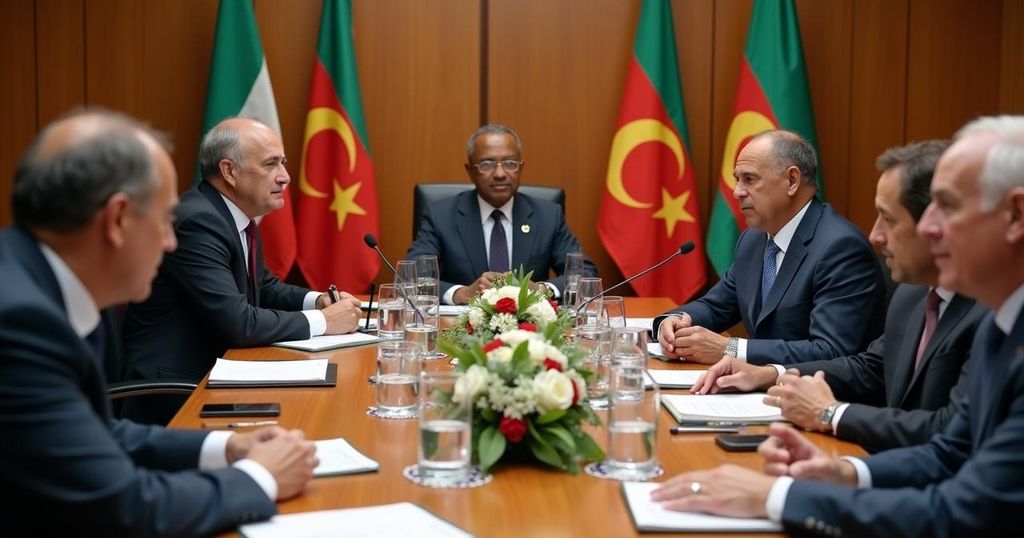Eritrea’s Isaias Afwerki convened with Somalia’s Hassan Sheikh Mohamud and Egypt’s Abdel Fattah el-Sisi on October 10, 2023, to strategize against perceived Ethiopian interference. Tensions have escalated between Ethiopia and Somalia since a memorandum involving Somaliland. Egypt aims to exert pressure on Ethiopia amidst its conflict over the GERD, while Eritrea cultivates regional alliances amid its own concerns. Despite the rhetoric, experts suggest that military confrontation is unlikely in the near term due to various domestic challenges.
On October 10, 2023, Eritrea’s long-standing leader Isaias Afwerki hosted a significant trilateral summit in Asmara with Somalia’s President Hassan Sheikh Mohamud and Egypt’s President Abdel Fattah el-Sisi. This rare meeting focused on strategies to counter external interference in regional affairs. According to the joint statement released post-conference, discussions emphasized enhancing cooperation to bolster Somali state institutions in order to combat terrorism and secure both land and maritime borders effectively. The summit’s relevance has escalated due to rising tensions in the region, particularly between Ethiopia and both Somalia and Eritrea. The decline in Ethiopian-Somali relations commenced in January, triggered by Ethiopia’s memorandum of understanding with Somaliland, a self-declared independent republic that Somalia views as an integral part of its territory. Ethiopia’s willingness to consider recognizing Somaliland’s independence in exchange for access to coastal territory for a naval base further provoked Somali ire. In response, Egypt has strategically intensified its influence over Somalia, propelled by its long-standing conflict with Ethiopia regarding the Grand Ethiopian Renaissance Dam (GERD). Following a military cooperation agreement with Somalia in August, Egypt has contributed arms to Mogadishu and proposed deploying troops to the country, potentially replacing Ethiopian forces engaged against Al-Shabaab. Somalia has indicated intentions to remove all Ethiopian military presence unless the MoU is rescinded. Eritrea, having previously supported Ethiopia during its civil war with the Tigray People’s Liberation Front (TPLF), has become increasingly wary of Ethiopian intentions, particularly regarding access to Eritrea’s ports, which Ethiopia lost upon Eritrea’s independence in 1993. Reports suggest that Afwerki perceives a looming threat of direct conflict and is thus cultivating alliances with Ethiopia’s adversaries. However, experts caution against expectations of immediate military confrontation. The prevailing weaknesses of Somalia, alongside Egypt’s focus on domestic issues like economic decline and external conflicts in the Middle East, render the likelihood of war less imminent. Analysts characterize current maneuvers as primarily diplomatic posturing rather than aggressive preparation for conflict. Observers note a regression in the previously achieved rapprochement, marked by a return to a ‘no war, no peace’ status.
The geopolitical landscape of the Horn of Africa has been notably shaped by the intricate relationships among Eritrea, Ethiopia, and Somalia, compounded by interventions from regional powers like Egypt. Eritrea has historically been involved in conflicts against Ethiopia and sought to align with Somalia amid increasing tensions following Ethiopia’s recognition of Somaliland. Ethiopia’s ambitions concerning Somaliland, coupled with Egypt’s longstanding concerns over the GERD, have further intensified regional discord. The potential for military confrontation, while spoken of, currently remains constrained by various nations grappling with their own internal pressures and conflicts.
The trilateral meeting between Eritrea, Somalia, and Egypt underscores a growing coalition against Ethiopian aggressions and territorial aspirations. The rising regional tensions and shifting alliances signal a precarious geopolitical atmosphere in the Horn of Africa. Despite the volatility, the likelihood of an armed confrontation remains subdued, with ongoing domestic challenges facing the involved nations. The dynamics of this situation require careful observation to gauge the future of regional stability.
Original Source: www.theafricareport.com







